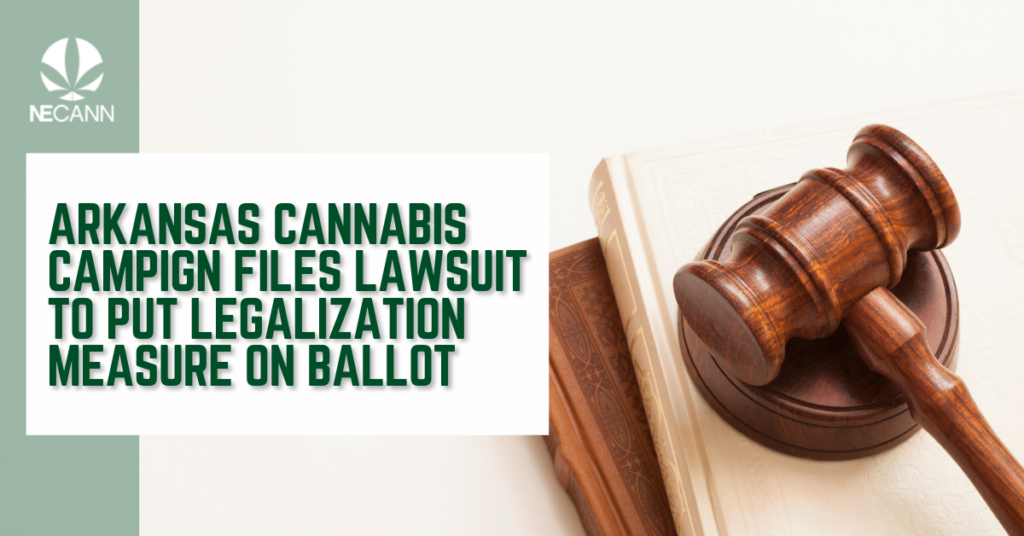The campaign for legalizing cannabis in Arkansas filed a lawsuit to put legalization measure on the ballot after the State Board’s rejection.
On August 4th, Arkansas activists took action to protect their voter-led initiative to legalize the use of cannabis by filing a lawsuit against the state.
This decision came one day after the state Board of Election Commissioners ruled that the measure’s ballot title and popular name are misleading.
By rejecting the initiative’s name and title, the Board of Election Commissioners effectively blocks the measure from the ballot.
The group has sued the state Supreme Court in order to get their proposed legalization initiative on the ballot.
According to MMJ Daily, “Last week, the secretary of state certified that Responsible Growth Arkansas collected enough valid signatures from registered voters to qualify the proposal for the ballot.”
This means Responsible Growth Arkansas had gathered enough signatures to put the question to voters but the proposal also needed approval from the board.
But it was rejected.
The campaign’s new lawsuit accuses the election commissioners board, members of which raised concerns about possible voter confusion over language related to issues such as THC limits, of “thwarting of the will of the people and their right to adopt laws by initiative.”
They also argue that the board uses an “overly stringent” approach that violates the state constitution and challenges a 2019 law that gives the board the power to certify ballot initiatives.
“The Board has attacked that heart through its incorrect rejection of the ballot title.”
According to an article from Ganjapreneur, Responsible Growth Arkansas attorney Steve Lancaster told the AP last week that the board’s decision was unfair because it would require the title to go into too much detail, requiring the title to be “thousands and thousands of words long” which he said “is not workable for a ballot.”
The campaign also filed a motion to have the lawsuit considered quickly. This is so that the November election can happen on time and ballots can be printed ahead of schedule. The secretary of state has to certify amendments for the ballot by August 25th.
Republican Governor Asa Hutchinson opposes the measure, while Democratic gubernatorial candidate Chris Jones supports it. The position of Republican nominee Sarah Sanders is unknown at this time.
Earlier this week, Gov. Asa Hutchinson (R)— who used to be the Drug Enforcement Administration head— said that it was most likely that the measure would end up before voters and advised police to help campaign against it.
Activists say they feel confident that if their measure qualifies for the ballot, voters will approve it this November. This is because the campaign was able to gather more than double the required signatures for ballot placement.
Here’s what the campaign’s marijuana legalization initiative would accomplish:
- Adults 21 and older could purchase and possess up to one ounce of cannabis from licensed retailers.
- Home cultivation would not be allowed.
- The measure would make a series of changes to the state’s existing medical cannabis program that was approved by voters in 2016, including a repeal of residency requirements to qualify as a patient in the state.
- The state Alcoholic Beverage Control (ABC) Division of the Department of Finance and Administration would be responsible for regulating the program and issuing cannabis business licenses.
- Regulators would need to license existing medical cannabis dispensaries to also serve adult consumers, and also permit them to open another retail location for recreational marijuana sales only. A lottery system would award licenses for 40 additional adult-use retailers.
- There are no provisions to expunge or seal past criminal records for marijuana or to provide specific social equity licensing opportunities for people from communities harmed by the war on drugs.
- The state could impose up to a 10 percent supplemental tax on recreational cannabis sales, in addition to the existing state and local sales tax.
- Tax revenue would be divided up between law enforcement (15 percent), the University of Arkansas for Medical Sciences (10 percent), and the state drug court program (five percent). The remaining revenue would go to the state general fund.
- People who own less than five percent of a marijuana businesses would no longer be subject to background checks.
- The legislature could not repeal or amend the state’s medical marijuana statutes without voter approval.
- Local governments could hold elections to prohibit adult-use retailers in their jurisdiction if voters approve the decision.
- Individuals could now own stake in more than 18 dispensaries.
- There would be advertising and packaging restrictions, including a requirement that marijuana products must be sold in tamper-resistant packages.
- Dispensaries would be able to cultivate and store up to 100 seedings, instead of 50 as prescribed under the current medical cannabis law.



